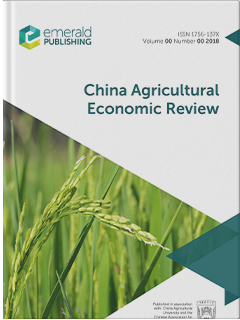不同碳政策下中国农业温室气体减排的成本效益
IF 4.6
2区 经济学
Q1 AGRICULTURAL ECONOMICS & POLICY
引用次数: 17
摘要
目的减少农业温室气体(GHG)排放是中国实现净零排放的重要组成部分。本研究评估了不同碳政策下中国农业温室气体减排的成本效益。本研究采用参数非径向距离函数方法,估算了2008-2017年中国农业部门温室气体的技术减排潜力和边际减排成本(MAC)。农业有望为中国的净零排放进程做出巨大贡献。本研究实证分析了不同碳政策下中国农业温室气体减排的成本效益。采用参数化非径向距离函数方法推导了2008-2017年期间温室气体的技术减排潜力和MAC。结果表明,2008-2017年中国农业温室气体减排没有显著改善。该国的农业部门可以减少20-40%的温室气体排放,平均值为31%。总体而言,西部省份的减排潜力大于东部省份。2008-2017年,全国平均碳排放成本为4656元/吨二氧化碳当量。大部分西部省份的MAC值明显高于大部分东部省份。与以往对温室气体减缓成本的部门估计相比,本研究的估计表明,在一些省份减少农业温室气体排放可能具有成本效益。中国政府应考虑将全国碳市场扩大到农业领域。实际意义中国政府应考虑扩大其全国碳市场,以覆盖农业部门。原创性/价值该领域的现有研究大多忽略了投入限制,这与碳减缓政策实践不一致,特别是在农业部门。本研究的方法整合了反映不同政策实践的投入和产出约束。本文章由计算机程序翻译,如有差异,请以英文原文为准。
The cost-effectiveness of agricultural greenhouse gas reduction under diverse carbon policies in China
PurposeMitigating agricultural greenhouse gas (GHG) emissions is an essential part of China's effort to achieve net-zero emissions. This study assesses the cost-effectiveness of China's agricultural GHG reduction under diverse carbon policies.Design/methodology/approachThe study employs a parametric non-radial distance function approach and estimates the technical abatement potential and marginal abatement cost (MAC) of GHG in China's agricultural sector for the 2008–2017 period.FindingsAgriculture is expected to make a great contribution to China's net-zero emissions progress. This study empirically analyses the cost-effectiveness of China's agricultural GHG reduction under diverse carbon policies. A parametric non-radial distance function approach is used to derive technical abatement potential and MAC of GHG for the 2008–2017 period. The results indicate that no significant improvement had been achieved in terms of agricultural GHG reduction in China during 2008–2017. The country's agricultural sector could reduce 20–40% GHG emissions with a mean value of 31%. In general, western provinces have larger reduction potential than eastern ones. The average MAC for the whole country is 4,656 yuan/ton CO2e during 2008–2017. For most western provinces, their MAC values are considerably higher than those for most eastern provinces. Compared with previous sectoral estimates of GHG mitigation cost, this study’s estimates indicate that reducing agricultural GHG emissions in some provinces is likely to be cost-effective. The Chinese government should consider expanding its national carbon market to cover agricultural sector.Practical implicationsThe Chinese government should consider expanding its national carbon market to cover agricultural sector.Originality/valueExisting studies in the field mostly ignore input constraints, which is inconsistent with carbon mitigation policy practice, especially in the agricultural sector. This study’s approach integrates both input and output constraints reflecting differing policy practice.
求助全文
通过发布文献求助,成功后即可免费获取论文全文。
去求助
来源期刊

China Agricultural Economic Review
AGRICULTURAL ECONOMICS & POLICY-
CiteScore
9.80
自引率
5.90%
发文量
41
审稿时长
>12 weeks
期刊介绍:
Published in association with China Agricultural University and the Chinese Association for Agricultural Economics, China Agricultural Economic Review publishes academic writings by international scholars, and particularly encourages empirical work that can be replicated and extended by others; and research articles that employ econometric and statistical hypothesis testing, optimization and simulation models. The journal aims to publish research which can be applied to China’s agricultural and rural policy-making process, the development of the agricultural economics discipline and to developing countries hoping to learn from China’s agricultural and rural development.
 求助内容:
求助内容: 应助结果提醒方式:
应助结果提醒方式:


